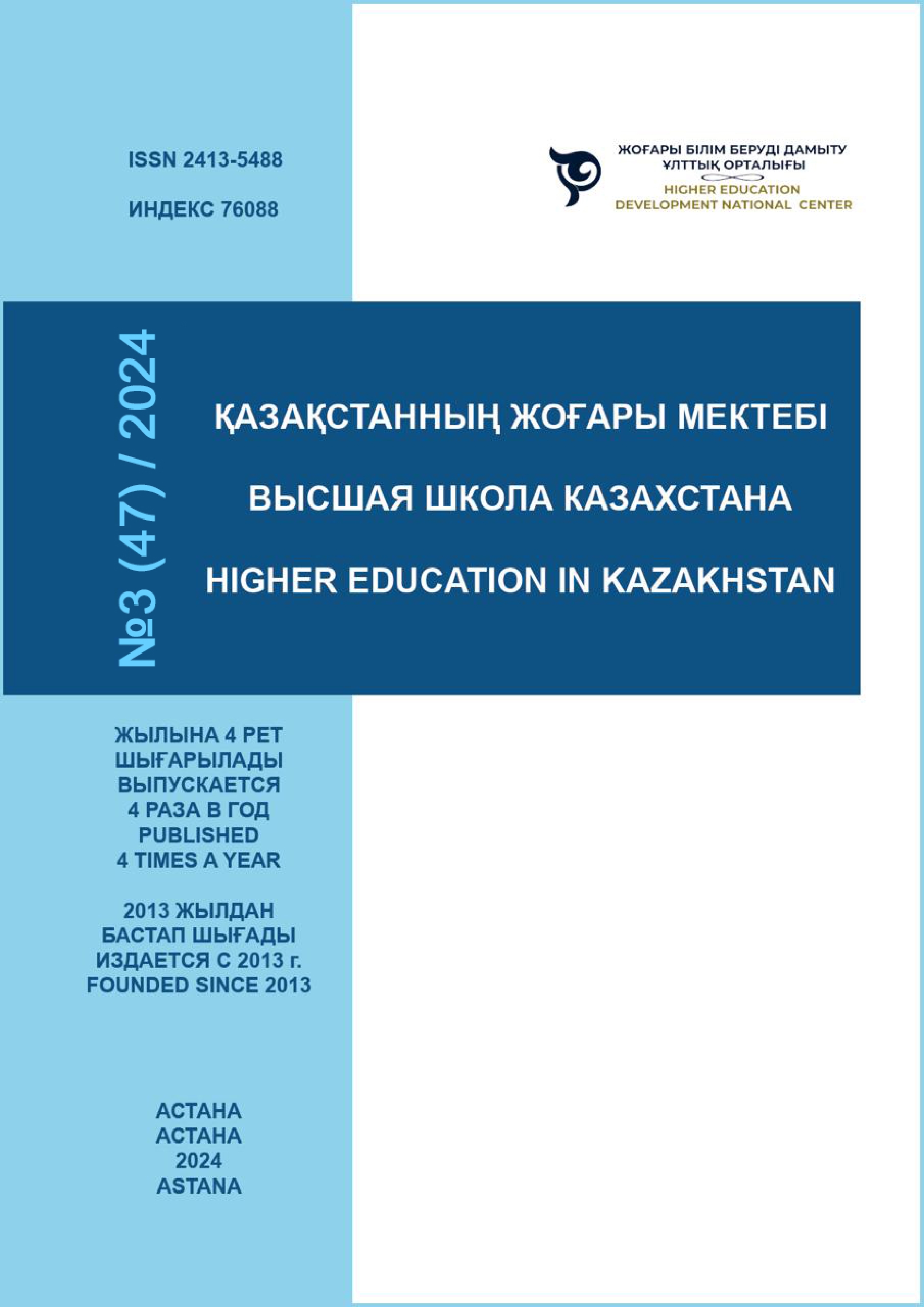COMPARATIVE ANALYSIS OF FOREIGN EXPERIENCE IN IMPLEMENTING PSYCHOLOGICAL AND PEDAGOGICAL GUIDANCE FOR SOFT SKILLS DEVELOPMENT OF UNIVERSITY STUDENTS
DOI:
https://doi.org/10.59787/2413-5488-2024-47-3-79-86Кілт сөздер:
soft skills, psychological and pedagogical guidance, foreign experience, university students, development, higher education.Аңдатпа
The article discusses modern methods and practices of psychological and pedagogical guidance for the soft skills development of students in higher educational institutions. With globalization and rapid technological progress, traditional teaching methods are becoming insufficient. The purpose of this study is to conduct a comparative analysis of modern methods and practices used in different countries, with the aim of adapting and introducing them into the higher education system of the Republic of Kazakhstan. The methodological basis of our research is a personal approach, which involves considering the individual characteristics of each student.
The analysis of international experience revealed effective methods, such as emotional intelligence development, active learning, coaching and mentoring, project-based and problem-based learning, gamification and the flipped classroom. These approaches demonstrate high effectiveness and can be adapted for use in the higher education system of the Republic of Kazakhstan. The introduction of these methods helps to improve the quality of education, improve the employment of graduates and their competitiveness in the labor market. Successful integration of these practices will require adaptation to local conditions and training of teachers, which will significantly increase the level of specialists’ training in Kazakhstan.
Әдебиеттер тізімі
Ministry of Education of the Republic of Kazakhstan (2023). On approval of the Concept of development of preschool, secondary, technical and vocational education of the Republic of Kazakhstan for 2023 - 2029 years. https://adilet.zan.kz/rus/docs/P2300000249 (access date 06/10/2024).
Tokayev, K-J. (2024). President Kassym-Jomart Tokayev’s State of the Nation Address. A fair state. One nation. Prosperous society. September 2024. https://www.akorda.kz/en/president-kassym-jomart-tokayevs-state-of-the-nation-address-181857
Cambridge Dictionary (2024). http://dictionary. cambridge.org/dictionary/english/soft-skills (access date 06/10/2024).
Majid, F., Zaini, M., Shafie, S., & Shafie, N. (2020). Soft Skills Instructional Practices: an investigation from the perspective of the immediate stakeholders. International Journal of Academic Research in Business and Social Sciences, 10(14), 49–60.
Hurrell, S. (2016). Rethinking the soft skills deficit blame game: Employers, skills withdrawal and the reporting of soft skills gaps. Human Relations, 69(3), 605-628. https://doi.org/10.1177/0018726715591636.
Raickaya, L.& Tihonova, E. (2018). Soft skills in the performance of Russian university teachers and students in the context of the world process. RUDN Journal of Psychology and Pedagogics, 15(3), 350-363. https://doi.org/10.22363/2313-1683-2018-15-3-350-363.
World Economic Forum (2020). The Future of Jobs Report 2020. https://www.weforum.org/reports/the-future-of-jobs-report-2020
Balcar, J. (2018). Soft skills and their importance on the Czech labour market. VŠB-TU Ostrava.
Hamari, J.& Koivisto, J. (2015). Why do people use gamification services? International Journal of Information Management, 35, (4), 419-431. https://doi.org/10.1016/j.ijinfomgt.2015.04.006.
Cinque, M. (2016). Lost in translation. Soft skills development in European countries. Tuning Journal for Higher Education, 3(2), 389-427.
Deep, S., Ahmed, A., Suleman, N., Abbas, M. Z., Nazar, U. & Razzaq, H. S. A. (2020). The problem-based learning approach towards developing soft skills: A systematic review. The Qualitative Report, 25(11), 4029-4054.
Moundy, K., Chafiq, N. & Talbi, M. (2022). Digital textbook and flipped classroom: Experimentation of the self-learning method based on the development of soft skills and disciplinary knowledge. International Journal of Emerging Technologies in Learning (iJET), 17(7), 240-259.
Kondratenko, A., Rudinskiy, I., Kondratenko, B.& Kravets, O. (2020). Emotional intelligence development: necessary modern technologies in students training. Journal of Physics: Conference Series, 1691, (1), 012143.
Cheng-Huan, C. &Yong-Cih, Y. (2019). Revisiting the effects of project-based learning on students’ academic achievement: A meta-analysis investigating moderators. Educational Research Review, 26, 71-81. https://doi.org/10.1016/j.edurev.2018.11.001.
Rossi, I., De Lima, J. D., Sabatke, B., Nunes, M. A. F., Ramirez, G. E., & Ramirez, M. I. (2021). Active learning tools improve the learning outcomes, scientific attitude, and critical thinking in higher education: Experiences in an online course during the COVID‐19 pandemic. Biochemistry and Molecular Biology Education, 49(6), 888-903.
Rahimova, L., Cyplakova, A.& Kozhevnikova, E. (2021). Mentoring and coaching as a basis for Soft Skills development. Modern Management: Theory and Practice, 148-151.
Garcia, I., Pacheco, C., Méndez, F. & Calvo‐Manzano, J. A. (2020). The effects of game‐based learning in the acquisition of “soft skills” on undergraduate software engineering courses: A systematic literature review. Computer Applications in Engineering Education, 28(5), 1327-1354.
Abdulaeva, Z. & Kurbanova, S. (2023). Project activity as a basis for the formation of soft skills competence in students (on the materials of the implemented project). Regional problems of economic transformation, 11, 170-181.














